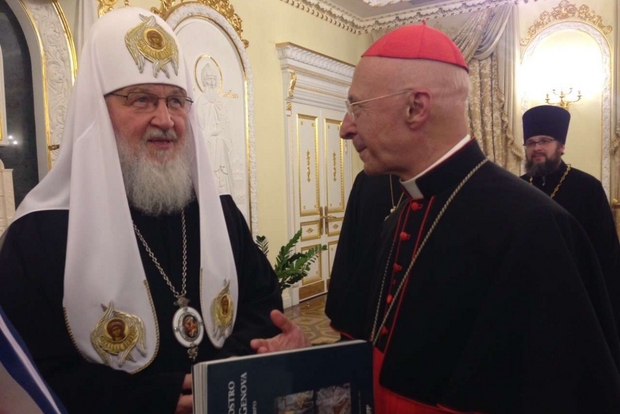Interview
Cardinal Angelo Bagnasco, CEI and CCEE President, spoke about the “significance” of the ecumenical meetings between Patriarch Kirill and Patriarch Bartholomew I, sharing his reflections on the future prospects of the Old Continent ahead of the 60th anniversary of the Treaties of Rome

Two important ecumenical journeys: the first in Moscow, to attend a meeting with Patriarch Kirill and the second in Istanbul with Patriarch Bartholomew I. Cardinal Angelo Bagnasco, President of the Italian Bishops’ Conference and of the Council of European Bishops’ Conferences (CCEE), in the past weeks experienced a set of significant events in the field of ecumenical dialogue involving Italy and Europe. He shared with SIR the “meaning” of the meetings along with his reflections on the future prospects of the Old Continent ahead of the celebrations marking the 60th anniversary of the Treaties of Rome. “The Church – the Cardinal pointed out – believes in the European Union, not one that is based on materialism and individualism, but one that is grounded in the spiritual and cultural realms. If the EU fails to respect Peoples’ identity it will continue being perceived as alien to them, and it will not have a future.”
Your Eminence, you first visited Moscow, where you had a meeting with Patriarch Kirill, Patriarch of Moscow and of All Russia. Then you were in Istanbul, where you were received by the Ecumenical Patriarch of Constantinople, Bartholomew I, two great dignitaries of the Orthodox Church. Why did you wish to meet them? What are your impressions on the meeting? What is the vision of ecumenism conveyed by the two Patriarchs?
My role as President of the Council of the Bishops’ Conferences of Europe (CCEE) also entails these meetings, to grow in our mutual understanding and proceed along the ecumenical journey. I was deeply impressed by Patriarch Kirill of Moscow and by the Ecumenical Patriarch Bartholomew. They both have a deep charisma, guided by the faith in Christ and by their love for the Church.
They both address the challenges of widespread secularism that the Catholic and Orthodox Churches are called to face with serenity and realism. Also for this reason we firmly believe in the importance of strengthening all forms of cooperation with a view to proclaiming our Lord Jesus across the Continent. We are all aware that the lack of Christian faith causes a loss of human dignity.
In the light of these two journeys throughout the Orthodox world, what is the message that the Eastern Churches can donate to Europe’s Western world?
The Eastern Churches have a strong sense of the sacred, which the Western world has almost lost, and which people are seeking today. It is expressed in a liturgy rich in chants, with repeated invocations and icons. The rich symbolical language, that reveals something about God and establishes a connection with the greater mystery, testifies to it. Here in the Western world we want that everything pertaining to the faith is clear and distinct according to rational criteria. Something is possible in this respect but not everything, because the Lord is greater and He embraces us.

The Italian delegation in Moscow took part in a lively debate on “spiritual and secular art as a tool to strengthen consensus and interaction between the peoples.” Italy and the Orthodox world share immense cultural, spiritual and artistic heritage. Which of the aspects emerged in Moscow could promote the encounter between the two peoples, along with their mutual understanding?
We jointly decided to hold regular meetings. We belong to worlds with different histories but we are called to face similar religious and cultural challenges. And most of all, we belong to the same Continent, whose plural history was inspired and concretized by Christianity, thereby shaping the face of the European man.
The reality of pilgrimage – a common experience of our two peoples – will be an item on the agenda of our next meeting, with mutual exchanges in the shrines and monasteries of our Countries. In this way we also intend to identify the deepest and most topical meaning of that widespread religious experience.

The Ecumenical Patriarchate is deeply committed in the works of the European Catholic-Orthodox Forum, which every year brings together the religious representatives of the Catholic and Orthodox Churches. The latest one held in Paris addressed the theme of terrorism. What has emerged to this regard in the meeting with Patriarch Bartholomew? What does this area of dialogue represent for contemporary Europe? How important is the dialogue between the Churches in a Europe that is building new walls? What is their common message to European societies?
The Catholic-Orthodox Forum was a joint initiative of the Catholic Church and of the Ecumenical Orthodox Patriarchate of Istanbul. All Orthodox Churches are its active members. In the January meeting in Paris we spoke about terrorism, a scourge afflicting our Continent. The deliverances shared by both sides conveyed a set of varied situations and analyses, extremely interesting and complementary. It is jointly believed that precisely because the phenomenon of terrorism presents itself in the guise of religion, there is an even greater need for the true God of Love and Peace.
We jointly acknowledged that far from waning, today there is a growing need for religion.
In many cases it hasn’t yet developed into faith, but the fact that people, especially the young, feel the calling of God, the fact that feel that life cannot be confined to material things, is a positive sign that brings hope and shows us the way that needs to be followed with courage. We are firmly convinced that Europe must recover her soul, the meaning of her history and her very identity, which is not economical, financial, nor merely political in nature.
At the end of March, the heads of government and State of EU member Countries will convene in Rome to attend the celebrations marking the 60th anniversary of the Treaties of Rome. Europe is in a deep crisis. European peoples have stopped believing in the European project. After the Brexit more Countries are considering leaving the EU. The dream of the European fathers appears to be falling to pieces. Why is it important to remain in Europe? What does Europe still have to say to contemporary humanity? What could be the role of the Churches in furthering the unity of the peoples?
The 60th anniversary of the European Treaty is a propitious time for the Heads of State to reaffirm the European dream, making a serious examination of conscience to establish whether the project has remained faithful to the founding Fathers. Indeed, there are signs of diffidence and distancing from the EU. It would be irresponsible not to take them seriously.
The Church believes in the European Union, not one that is based on materialism and individualism but one that is grounded in the spiritual and cultural realms. If the EU fails to respect People’s identity it will continue being perceived as alien to them, and it will not have a future.
We believe it would bring no good: like every world Continent, Europe has a mission at global level. That mission is related to a growing globalised world.